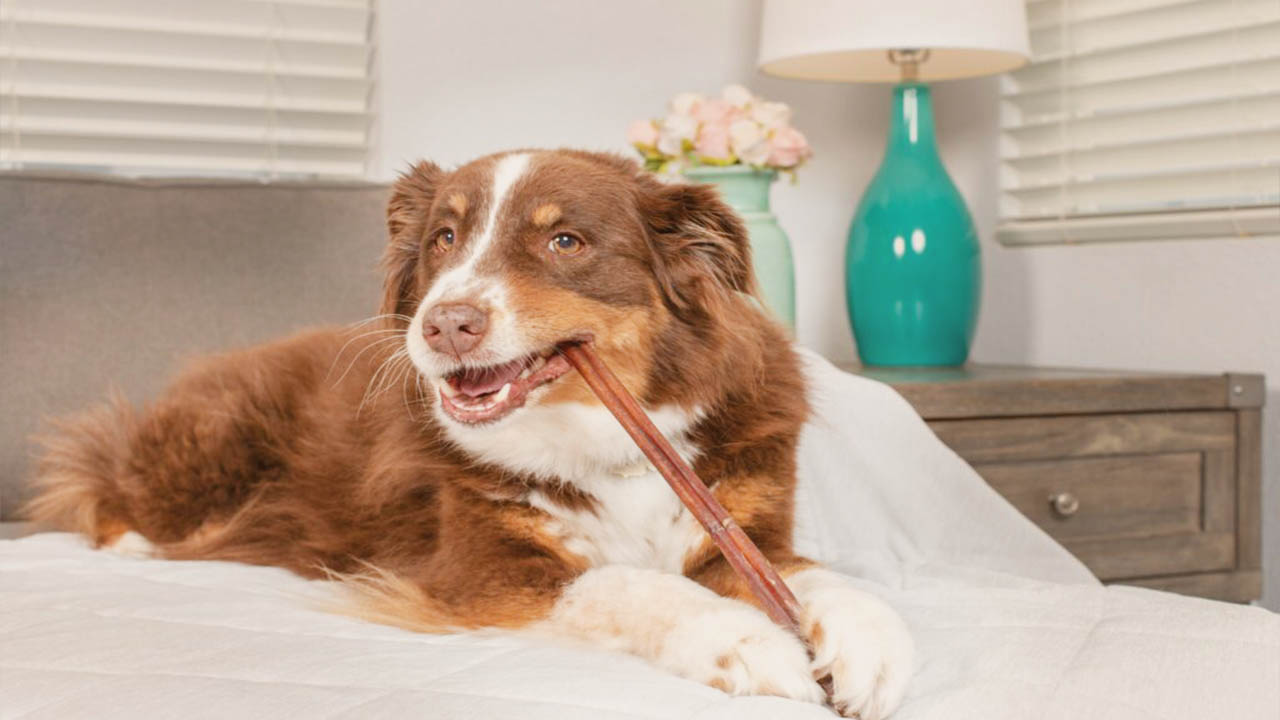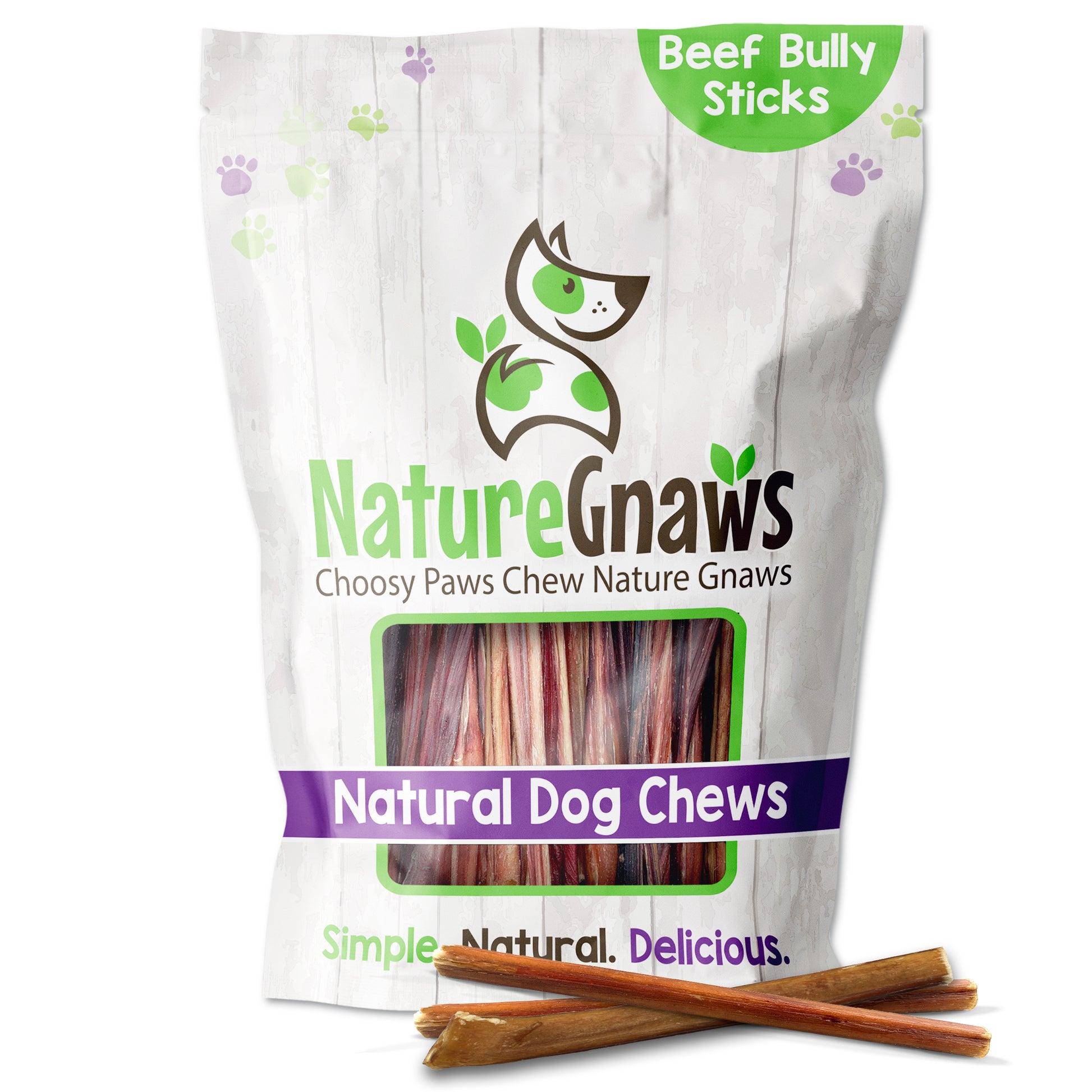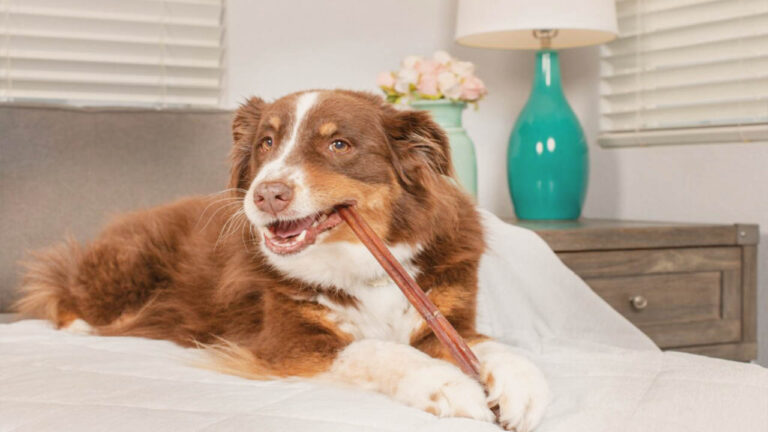Yes, it is not safe for dogs to chew on sticks. Dogs can injure their mouths or swallow splinters that can cause internal damage. Additionally, certain types of wood can be toxic to dogs if ingested. Providing safe and appropriate chew toys is essential for your dog’s dental health and overall well-being. It’s important to supervise your dog’s playtime and discourage them from chewing on sticks to prevent potential injuries and health issues.
Instead, consider giving them durable chew toys specifically designed for dogs to ensure their safety and enjoyment. By being mindful of what your dog chews on, you can help keep them healthy and happy.

The Dangers Of Dogs Chewing On Sticks
Dogs have an instinct to chew, and while it may be tempting to let them chew on sticks, it’s important to be aware of the risks involved. Chewing on sticks can pose several dangers to your furry friend, including splinter risk, choking hazards, and ingestion risks.
Splinter Risk
One of the main dangers of dogs chewing on sticks is the risk of splinters. Stick splinters can cause small cuts or scrapes in your dog’s mouth and throat, leading to discomfort and potential infections. Splinters can also get stuck in their gums or between their teeth, causing pain and potential dental issues. It’s essential to keep an eye on your dog while they’re chewing on sticks and intervene if you notice any signs of discomfort or bleeding.
Choking Hazard
Chewing on sticks can also present a choking hazard for dogs. Sticks can easily break into smaller pieces, and if your dog swallows a large chunk or gets a smaller piece lodged in their throat, it can lead to choking. Choking is a serious emergency that requires immediate action. Keep your dog’s chewing habits in check and avoid giving them sticks that are too small or easily breakable to minimize the risk.
Ingestion Risks
When dogs chew on sticks, there is a risk of them swallowing indigestible pieces. These pieces can cause blockages in the digestive system, leading to serious health issues that may require surgery to remove. Additionally, some sticks may have been treated with chemicals or pesticides, which can be toxic if ingested. It’s crucial to ensure your dog doesn’t ingest any part of the stick and to provide them with safe alternatives for chewing, such as chew toys specifically designed for dogs.
In conclusion, while dogs may enjoy chewing on sticks, it’s important to prioritize their safety. The potential dangers of splinter risk, choking hazard, and ingestion risks should be taken seriously. Keep a close watch on your dog’s chewing habits and provide them with appropriate alternatives to sticks to avoid any potential harm.
Alternative Chew Toys For Dogs
Dogs have a natural inclination to chew, and offering safe and suitable chew toys is crucial in preventing them from chewing on unsafe objects like sticks. Here are some alternatives to sticks that are safe and beneficial for your furry friend.
Rubber Toys
Rubber toys provide a durable and safe option for your dog to chew on. They come in various shapes and sizes, including twisted ropes, balls, and interactive toys. They are great for promoting dental health, as they help remove plaque and tartar. Make sure to get toys that are made from natural, non-toxic rubber to ensure your dog’s safety.
Nylon Bones
Nylon bones are long-lasting chew toys that are designed to withstand heavy chewing. They come in different flavors and textures to keep your dog engaged and satisfied. They are also effective in promoting healthy teeth and gums. Look for nylon bones that are free from harmful chemicals and additives.
Dental Chews
Dental chews are specifically formulated to improve your dog’s dental hygiene. They help reduce plaque and freshen your dog’s breath while providing a satisfying chewing experience. Look for quality dental chews that are approved by veterinarians and are suitable for your dog’s size and breed.
How To Redirect Your Dog’s Chewing Behavior
Dogs have an instinct to chew, and while sticks may seem like an appealing option for them, it’s important to redirect their chewing behavior to ensure their safety. Here are some effective techniques to guide your dog’s chewing habits in a more appropriate direction.
Positive Reinforcement
Using positive reinforcement when redirecting your dog’s chewing behavior can be highly effective. Offer praise and treats when your dog chews on their toys instead of sticks. This will help them associate good behavior with positive rewards, encouraging them to choose their toys over sticks.
Providing Appropriate Toys
Offer a variety of toys specifically designed for chewing. Look for toys made of durable materials that are safe for your dog to gnaw on. Rotate the toys to keep things interesting, preventing boredom and reducing the likelihood of your dog seeking out sticks as an alternative.
Training Techniques
Consistent training is essential for successfully redirecting your dog’s chewing behavior. Use a firm, yet gentle, tone to discourage chewing on sticks and redirect them to their designated toys. Repetition and patience are key to reinforcing this behavior.

Credit: www.amazon.com
Signs And Symptoms Of Complications
Chewing on sticks can pose risks for dogs, with signs of complications including splinters stuck in gums, choking hazards, and intestinal blockages. Monitor your pet for vomiting, difficulty swallowing, or changes in behavior to ensure their safety.
Mouth Or Throat Irritation
If your dog chews on sticks, one of the potential complications is mouth or throat irritation. The rough edges of sticks can cause scratches or cuts in your dog’s mouth or throat, leading to discomfort and pain. You may notice your dog pawing at their mouth or excessively drooling. Additionally, your furry friend may show signs of sensitivity while eating or drinking, such as reluctance to eat or drink, chewing on one side of the mouth, or tilting the head to one side.
Gagging Or Coughing
Gagging or coughing is another sign of complications that could arise from dogs chewing on sticks. If a portion of the stick gets lodged in the back of the throat or the airway, it can cause gagging or coughing. This is the body’s natural response to attempt to clear the obstruction. Observe your dog closely for any recurring coughing or gagging sounds. If you notice persistent coughing or gagging, it is crucial to consult your veterinarian immediately for further evaluation.
Vomiting Or Diarrhea
Vomiting or diarrhea are additional symptoms of potential complications due to stick chewing. If your dog ingests a stick, it can irritate the stomach or intestinal lining, leading to vomiting or diarrhea. Vomiting is the body’s way of trying to expel the foreign object, while diarrhea can occur due to the stick’s abrasive nature or the body’s inflammatory response. Keep an eye out for repeated episodes of vomiting or diarrhea, as they can lead to dehydration and further health issues.
When To Seek Veterinary Care
While chewing on sticks is a common behavior among dogs, it is important to monitor your furry friend to ensure their safety. In some cases, this seemingly harmless habit can lead to complications. Here are some situations where you should consider seeking veterinary care to ensure your dog’s well-being.
Persistent Symptoms
If your dog continues to exhibit persistent symptoms after chewing on sticks, it may be time to consult your veterinarian. Common symptoms to watch out for include vomiting, diarrhea, excessive drooling, or difficulty in breathing. These persistent symptoms may indicate that your dog is experiencing an adverse reaction to the stick or that a piece of the stick may be stuck in their digestive system.
Visible Injuries
While chewing on sticks is generally harmless, accidents can happen, and dogs may get injured. If you notice any visible injuries such as bleeding gums, mouth lacerations, or broken teeth, it is important to seek veterinary care. These injuries can be painful for your dog and may require professional attention to prevent infection or further complications.
Behavior Changes
Another situation that calls for a visit to the vet is if you notice any sudden behavior changes in your dog after chewing on sticks. Dogs who are typically well-behaved may become agitated, restless, or lethargic. These behavior changes may be a sign of discomfort or pain and could indicate an underlying issue that needs to be addressed by a professional.

Credit: naturegnaws.com

Credit: www.amazon.com
FAQ For Is It Safe For Dogs To Chew On Sticks
Can Dogs Get Sick From Chewing On Sticks?
Yes, dogs can get sick from chewing on sticks. Splinters can cause injury to the mouth or throat and the stick can harbor bacteria or parasites. It’s best to provide safe chew toys specifically designed for dogs.
Are There Any Safe Sticks For Dogs To Chew On?
While there are sticks that are safe for dogs to chew on, it’s still best to use caution. Choose sticks that are free from splinters and chemicals. Supervise your dog while chewing and discard any sticks that become damaged or pose a risk.
What Are The Alternatives To Sticks For Dogs To Chew On?
There are many alternatives to sticks for dogs to chew on. Consider providing your dog with durable chew toys made from rubber or nylon. These toys are specifically designed for dogs and are a safer alternative to sticks.
Conclusion
While dogs have an instinct to chew on sticks, it is important to consider the potential risks associated with this behavior. Sticks can splinter and cause oral injuries or puncture internal organs if swallowed. It is safer to provide your pup with dog-friendly chew toys that are specifically designed for their chewing needs.
Remember, a happy and healthy pup is the best reward for responsible pet ownership.



